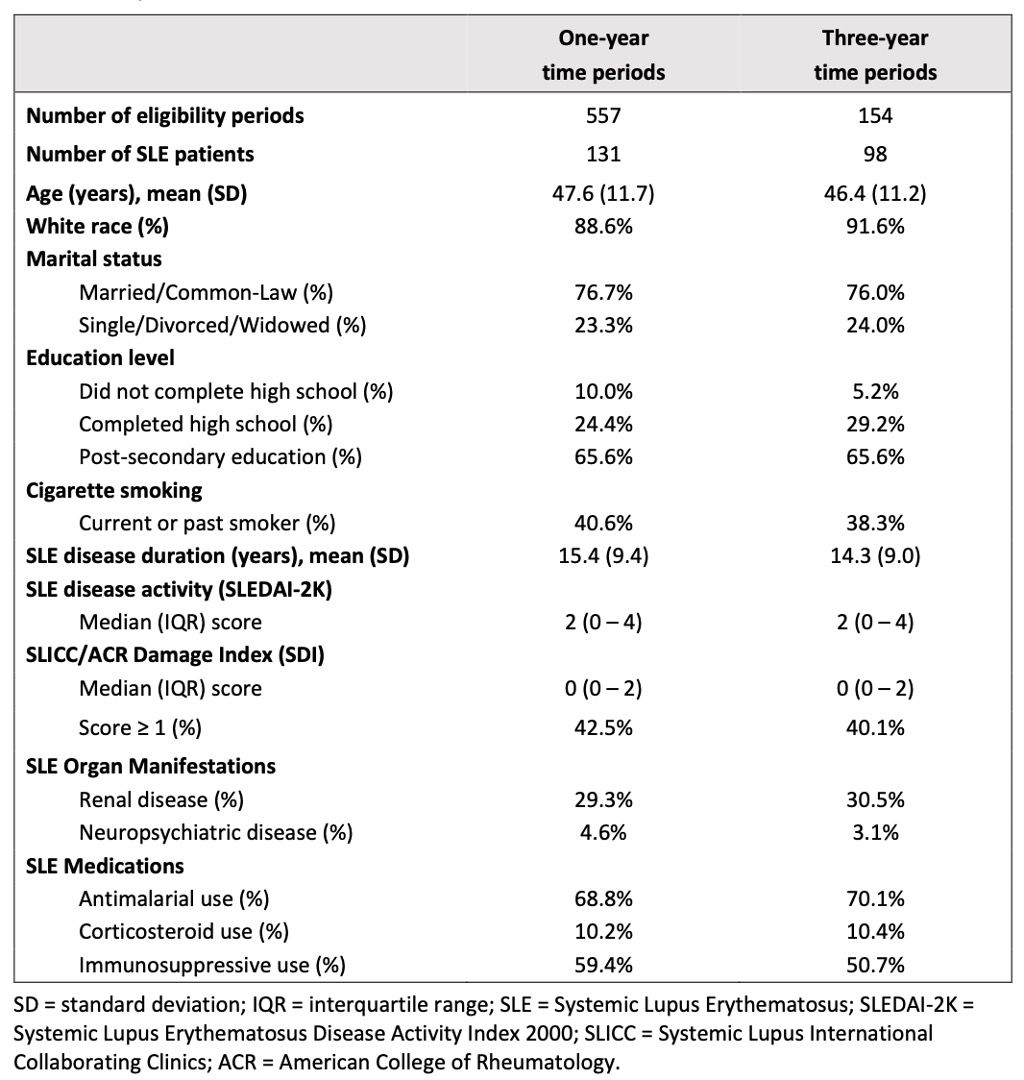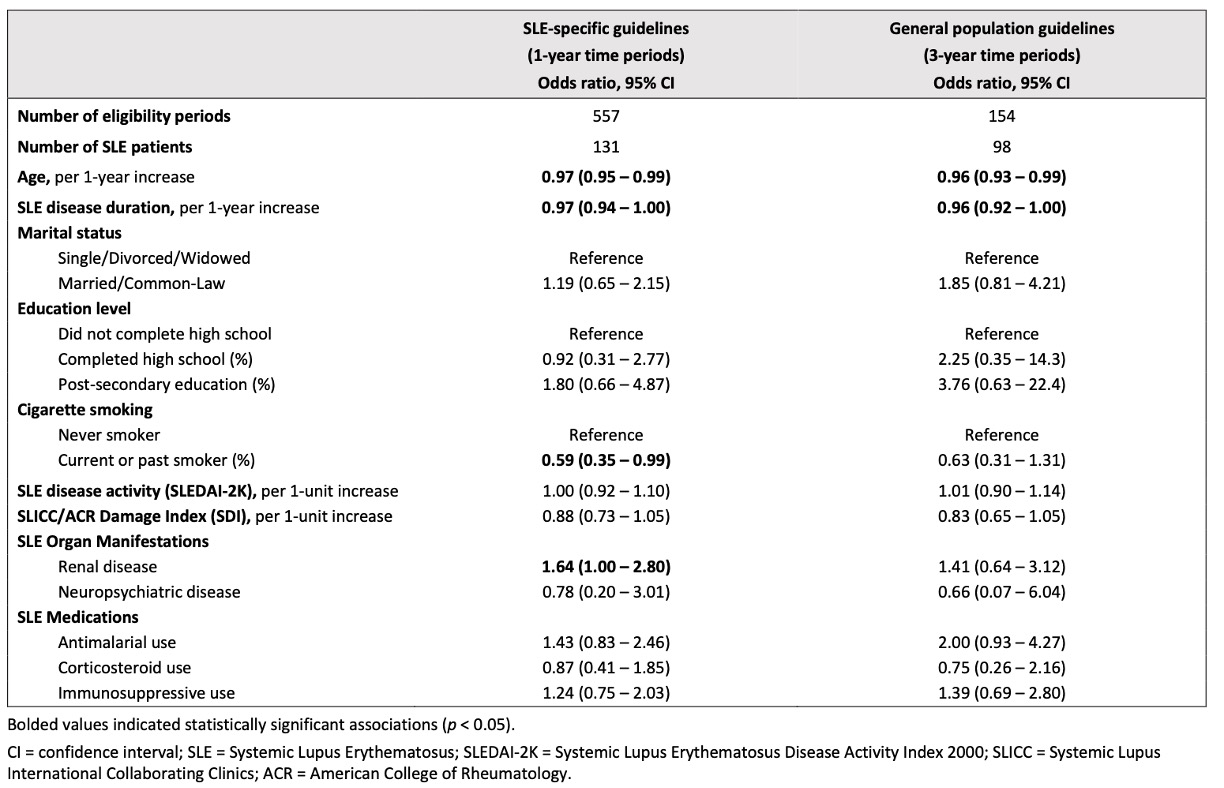Session Information
Date: Tuesday, November 14, 2023
Title: (2257–2325) SLE – Diagnosis, Manifestations, & Outcomes Poster III
Session Type: Poster Session C
Session Time: 9:00AM-11:00AM
Background/Purpose: Women with systemic lupus erythematous (SLE) are at increased risk for cervical dysplasia and cervical cancer. In our jurisdiction, current guidelines recommend that average-risk women aged 25-69 years should undergo Pap tests for cervical cancer screening once every 3 years. Lifelong annual screening is recommended for immunocompromised women, including those with a history of HIV infection or prior organ transplant. Recent Canadian guidelines have suggested that women with SLE should be considered as part of this high-risk group. However, the uptake of these recommendations in clinical practice is unclear.
In this study, we evaluated the provision of cervical cancer screening in a Canadian cohort of women with SLE. Specifically, we measured adherence with current guidelines for the frequency of cervical cancer screening. We also sought to identify SLE-specific predictors of adherence to cervical cancer screening guidelines.
Methods: This was a longitudinal study of women aged 25-69 years followed in the Lupus clinic at a single academic medical centre in Canada between January 2014 and December 2019. All participants met the 1997 revised ACR classification criteria for SLE. Women were excluded from the analysis if they were not eligible for routine cervical cancer screening due to prior total hysterectomy, HIV infection, organ transplant, or history of cervical dysplasia/cancer. During the study period, participants underwent standardized clinical and laboratory assessments on an annual basis. Information regarding cervical cancer screening practices was obtained retrospectively through electronic chart review. We measured adherence with general population guidelines (i.e., Pap test once every 3 years) and SLE-specific guidelines (i.e., Pap test once annually) for the frequency of cervical cancer screening. To achieve this, two separate analyses were conducted, whereby follow-up was divided into 1) one-year eligibility periods; and 2) three-year eligibility periods. For each analysis, adherence was defined as the proportion of time periods where ≥ 1 Pap test was performed. Pre-specified demographic and clinical variables were evaluated as predictors of adherence to screening guidelines using generalized estimating equation (GEE) models.
Results: There were 557 one-year eligibility periods contributed by 131 SLE patients; and 154 three-year eligibility periods contributed by 98 SLE patients. Participant characteristics are summarized in Table 1. Pap tests were performed in 125/557 (22.4%) of 1-year eligibility periods and in 79/154 (51.3%) of 3-year eligibility periods. Mean adherence rates were 49.5% for general population screening guidelines and 23% for SLE-specific guidelines.
Predictors of adherence to general population screening guidelines included age and SLE disease duration, while predictors of adherence to annual screening included the above variables, as well as cigarette smoking status and history of lupus nephritis (Table 2).
Conclusion: Adherence to cervical cancer screening guidelines was suboptimal in SLE patients. Future work should aim to identify barriers to routine cervical cancer screening in this population.
To cite this abstract in AMA style:
Cho L, Legge A. Predictors of Adherence to Cervical Cancer Screening Guidelines Among Patients with Systemic Lupus Erythematosus [abstract]. Arthritis Rheumatol. 2023; 75 (suppl 9). https://acrabstracts.org/abstract/predictors-of-adherence-to-cervical-cancer-screening-guidelines-among-patients-with-systemic-lupus-erythematosus/. Accessed .« Back to ACR Convergence 2023
ACR Meeting Abstracts - https://acrabstracts.org/abstract/predictors-of-adherence-to-cervical-cancer-screening-guidelines-among-patients-with-systemic-lupus-erythematosus/


